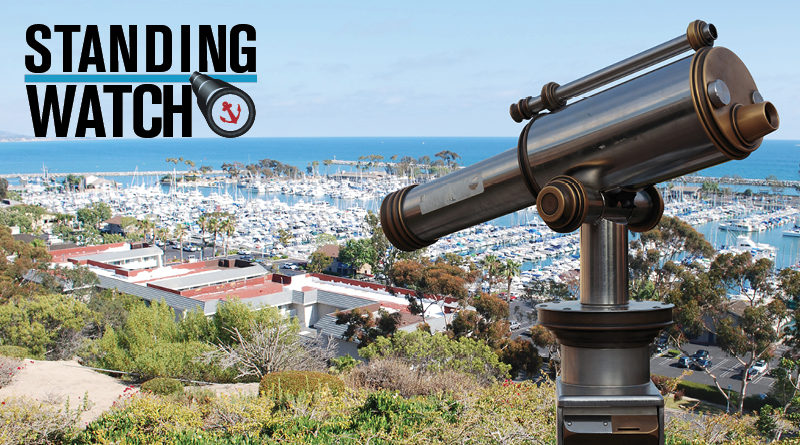Coastal Access: Appeals Court Ruling Benefits All Water Users
Billionaire who blocked public access to beach near San Francisco ordered to keep coast open to everyone.
STATEWIDE — A small stretch of beach on California’s north-central coast has been ground zero in a battle between rich elite and everyday citizen. The fight for control over Martin’s Beach near Half Moon Bay – about one hour south of San Francisco – was the latest chapter in an increasingly popular class narrative pitting the few (the wealthy 1 percent) against the many (the common 99 percent).
At the heart of this battle: California’s law granting public access to any waterway within the state.
A member of that proverbial one percent club suffered a significant legal defeat in early August, as a California appeals court ruled Vinod Khosla – a Silicon Valley billionaire who owns a prime piece of coastal real estate in San Mateo County – must allow the public to access Martins Beach. (Khosla, who made a fortune through Sun Microsystems, purchased land adjacent to the beach in 2008 and blocked the public’s access to the coast shortly thereafter.)
The legal battle might not be entirely over – Khosla can still appeal – but the ruling is a victory for California’s masses. Public access to any waterway within the state’s borders is a lawful birthright for Californians and her visitors. Khosla’s current legal setback both upholds the birthright and – most importantly – establishes a precedent in the never-ending battle between public access and economic might.
Regulating access of Martins Beach is not limited to this quiet stretch of sand, water and land on the outer edges of the San Francisco Bay Area. The final outcome of this contentious matter – whether or not Khosla appeals the decision – will have a ripple effect up and down the California coast and at every inland waterway.
Many boaters rely on coastal access to be able to launch their boat. Public beach access is also a necessity for anchored or moored boats – imagine securing your 35-footer on open water but not having a place to disembark from your dinghy. (There’s a stretch of beach on Shelter Island in San Diego where moored boaters leave their dinghies when they come ashore.)
Kayakers, standup paddleboard users and other personal watercraft owners also rely on public access to the water for launching capabilities.
Preservation of beach and coastal access was a necessary element of the recently completed Harbor Sands resort at Catalina Island’s Two Harbors. Visitors to the small village aren’t prevented from walking through the resort (there is a rental charge for beach chairs and palapas, however). A strip of beach in front of Harbor Sands is still preserved and not part of the Harbor Sands perimeter. Boaters, kayakers and standup paddleboard users can still access the beach area.
A yacht club in Newport Beach recently committed funding to public infrastructure guaranteeing boaters and others access to the water. The California Coastal Commission required such funding before approving the club’s plans to renovate its aging waterfront clubhouse.
Many others made similar concessions when it came to waterfront projects in California. The mantra of preserving public coastal access for all was also a major factor in the Coastal Commission’s denial of the redevelopment of Banning Ranch near the central Orange County coast.
Public access to the coast as a right was also the driving force in the Coastal Commission’s reported decision to fine beachfront property owners in Malibu in late 2016. The private property owners were reportedly issued a $5.1 million fine for blocking public access to a stretch of beach in the upscale coastal enclave.
California’s coastal, lakefront and river beaches might be one of the last bastions for egalitarian use of land. Khosla spent $37 million on his waterfront property in Martins Beach. Yet someone earning $37,000 annually at any given job has as much right to enjoy the beachfront as the Silicon Valley billionaire. Surfrider Foundation’s successful legal challenge against Khosla (so far) helped preserve such access.
So far it seems as if the Coastal Commission and courts are enforcing California state law. Yet someone else might invariably come along and test the limits of public coastal access. Do you believe all waters within California should be open for all to access? Or should there be some leeway for private landowners or developers to block off certain beaches from the public domain?
Reach out to the following organizations and share your opinion.



Though I approve of keeping the access to the waterways public, please do not dilute the argument with blatant uses of political blackmail and coercion as a laudable.
“A yacht club in Newport Beach recently committed funding to public infrastructure guaranteeing boaters and others access to the water. The California Coastal Commission required such funding before approving the club’s plans to renovate its aging waterfront clubhouse.” This is nothing more than pure blackmail, and does a disservice to your story, requiring a private club on what has been private land for years to open an access so that they can fix aging infrastructure, would be akin to requiring you to repair the street in front of your house because you need to repair termite damage to your property.
Think before you type.
I am not affiliated with nor do I do any business with Yacht club in Newport Beach or for that matter any yacht club. But I do own property and what you placed in print ought to scare any property owner of government overreach or blackmail.